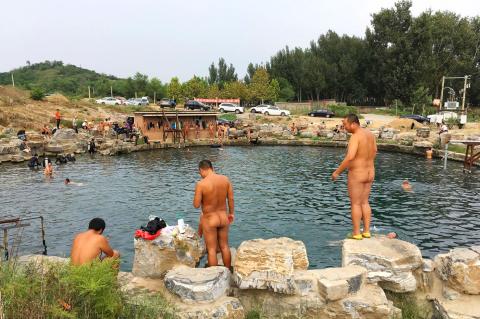The water might be chilly, but dozens of naked men happily relax in an outdoor pool in a Beijing suburb making the most of the sunshine.
“This is a paradise for Chinese nudists,” 18-year-old Zhen said, displaying a tiger tattoo on his chest.
The small pond next to a high-voltage power line and shabby brick building is the only nudist bathing spot near the Chinese capital — and one of few in the entire nation.

Photo: AFP
China has a tradition of modesty: Pornography is forbidden, nudity in films is strictly limited and plunging necklines are a rare sight.
Diehard skinny-dippers attract lots of attention and prudish authorities often close down the places where they swim.
However, nudists from all walks of life and regions defy social norms to gather near a residential area in the town of Fangshan.
“People have been bathing naked here for 20 years — we don’t pay attention to them anymore,” an 84-year-old resident said.
Locals previously lodged complaints with authorities, but it remains a popular nudist spot.
Xiao Li said he comes to the pond to “relieve pressure” from a busy job in the chemicals industry.
“We don’t bother anyone, but we obviously have to respect the residents,” he said.
Behind him tanned men in their 50s smoke and play cards around an old wooden table, making a cheerful racket, while young people jump from a platform into the 16°C water.
While women are welcome to take a dip with the men, they have not dared.
Taboos surrounding female nudity are still very strong, the men said.
The rudimentary facilities include some plastic chairs, a rusty wire for a clothesline and two red brick shacks, with a sign reading “Bathing Forbidden” written in white chalk.
Under Chinese law, anyone caught “voluntarily exposing their body in a public place” can be placed under administrative detention for up to 10 days.
But “the police are flexible,” said Zhang Zhigang, a lawyer specializing in subcultures.
“They intervene in busy public places,” he added. “ In isolated areas they usually ask nudists to leave.”
Ha, 80, said he has been swimming naked for 30 years and comes to Fangshan every day.
“Nudism is a culture, the people are civilized. Will it grow? I’m not sure, the mentalities are still backward,” he said.
China has many indoor spas or hot springs where same-sex nudity is allowed, but nudism is taboo.
“Most Chinese judge it to be perverted — they consider it to be like sexual harassment or exhibitionism,” said Fang Gang (方剛), a researcher and author of the 2012 book The Nudists (裸體主義者), the first book published in China on the subject.
Fang estimates that one out of every 10,000 Chinese practises nudism — or 140,000 people at most.
However, it is “on the rise,” he said.
The only nudist beach in China opened in 2000 on the tropical island of Hainan in the country’s south, but was closed in 2014 after holidaymakers complained.
“Normal people don’t bathe and sunbathe nude in public,” then-Hainan provincial governor Luo Baoming (羅保銘) said.
In 2009, authorities put a stop to an outdoor nudist bath near the eastern city of Hangzhou a day before it was due to open.
At the time an online poll by state-run newspaper Global Times showed that 60 percent of Internet users “accepted” nudism, while 57 percent judged the opening of the Hangzhou site as being “completely normal.”
“Nudism is more accepted than before,” said Zheng, 49, who works in marketing and has been nude bathing in Fangshan for 10 years. “Even my wife understands me.”
“With other nudists we find on social networks we organize nude hikes around Beijing,” he said.
Fang says altering attitudes towards nudism will be difficult in the absence of a federation to represent Chinese nudists’ interests.

China on Monday announced its first ever sanctions against an individual Japanese lawmaker, targeting China-born Hei Seki for “spreading fallacies” on issues such as Taiwan, Hong Kong and disputed islands, prompting a protest from Tokyo. Beijing has an ongoing spat with Tokyo over islands in the East China Sea claimed by both countries, and considers foreign criticism on sensitive political topics to be acts of interference. Seki, a naturalised Japanese citizen, “spread false information, colluded with Japanese anti-China forces, and wantonly attacked and smeared China”, foreign ministry spokesman Lin Jian told reporters on Monday. “For his own selfish interests, (Seki)

VENEZUELAN ACTION: Marco Rubio said that previous US interdiction efforts have not stemmed the flow of illicit drugs into the US and that ‘blowing them up’ would US President Donald Trump on Wednesday justified a lethal military strike that his administration said was carried out a day earlier against a Venezuelan gang as a necessary effort by the US to send a message to Latin American cartels. Asked why the military did not instead interdict the vessel and capture those on board, Trump said that the operation would cause drug smugglers to think twice about trying to move drugs into the US. “There was massive amounts of drugs coming into our country to kill a lot of people and everybody fully understands that,” Trump said while hosting Polish President

Japan yesterday heralded the coming-of-age of Japanese Prince Hisahito with an elaborate ceremony at the Imperial Palace, where a succession crisis is brewing. The nephew of Japanese Emperor Naruhito, Hisahito received a black silk-and-lacquer crown at the ceremony, which marks the beginning of his royal adult life. “Thank you very much for bestowing the crown today at the coming-of-age ceremony,” Hisahito said. “I will fulfill my duties, being aware of my responsibilities as an adult member of the imperial family.” Although the emperor has a daughter — Princess Aiko — the 23-year-old has been sidelined by the royal family’s male-only

A French couple kept Louise, a playful black panther, in an apartment in northern France, triggering panic when she was spotted roaming nearby rooftops. The pair were were handed suspended jail sentences on Thursday for illegally keeping a wild animal, despite protesting that they saw Louise as their baby. The ruling follows a September 2019 incident when the months-old feline was seen roaming a rooftop in Armentieres after slipping out of the couple’s window. Authorities captured the panther by sedating her with anesthetic darts after she entered a home. No injuries were reported during the animal’s time on the loose. The court in the